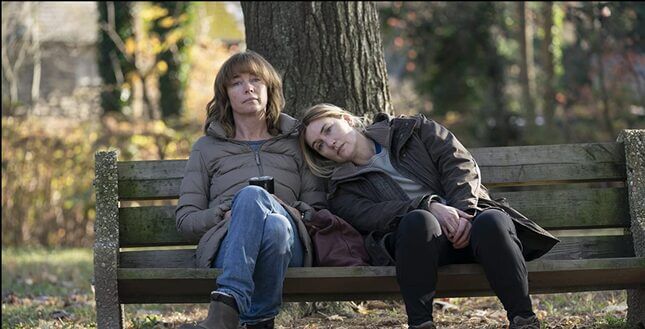

HBO’s latest prestige crime procedural, Mare of Easttown, scratches the itch for gritty, well-produced drama, neatly filling the hole left by other offerings like True Detective but with a much-needed tweak. Instead of being forced yet again to plumb the depths of police work as a proxy for masculinity, viewers are forced to contend with a woman detective struggling against her own personal demons to solve crime. Kate Winslet is the titular Mare of Easttown, a police detective working to solve a grisly murder in a small town where she knows everyone—a handicap but also a help. The first four episodes of the show are very much about police work and the drudgery of investigating crimes that are at their heart, grisly. But, as the program heads towards its conclusion, it is clearer that the show is less about the intricacies of investigation and more so about motherhood—what it means to be a good mother, and the infinite failures and successes that that entails.
Mare, played by Kate Winslet doing blue-collar drag in sweatpants, no makeup and hiking boots, is a detective first, but she is also a mother. As Doreen St. Félix noted in her review for the New Yorker, the show does an excellent job of not glamorizing the work that police do and does not valorize law enforcement in the way so many of these programs often do. “Mare’s profession functions more like a metaphor for worn-down maternalism,” she writes. It’s that maternal nature that Mare so instinctively uses in her work as a police officer that suffuses the entire show. In Easttown, young girls have a habit of disappearing. Other shows would focus heavily on the sensational glamour of the image of the dead girl, and though the first episode lingers on the gruesome nature of the crime in question, the missing and dead girls that haunt Easttown are more like a secondary plot, the engine that drives forth the exploration of how women relate to their daughters, in all of its mess.
Spoilers ahead.
Mare and her daughter, Siobhan, have a relationship that’s haunted by the specter of Kevin, Mare’s son who died by suicide and is glimpsed only in flashbacks, and through the documentary that Siobhan is making about her brother, in an attempt to understand why he took his own life. Drew, Kevin’s son whom Mare is raising as her own, is essentially his proxy; the trouble is, Drew’s mother, Carrie (Sosie Bacon), wants custody. Mare is haunted by the mistakes of her past and is desperate to make right. Her decisions don’t always make sense and are often more damaging than simply just letting go, but her punishment is simply watching her carefully laid plans go to waste. There are very few men in Easttown, and none of them seem very permanent. It’s as if the entire town runs on the grief of mothers missing their daughters, and the children of those daughters languishing in their parents’ absence will eventually inherit the trauma as their birthright.
Mare is essentially the ersatz mother of the entire town, by dint of both profession and provenance. Everybody knows Mare, and Easttown’s borders feel as if they are constantly shrinking, excising outsiders. The claustrophobia that hangs in the sodden gray skies and the rows of townhouses is the sort that seeps into the bones; Mare’s world is compressed to the world she’s always known, and by being a detective, she’s taken on the work of managing, and mothering, the entire town, whether she wants to or not.
Notably, there are few explicit judgments issued about the quality or validity of any of the mothers on the show, of which there are many. Dawn Bailey, Mare’s childhood friend, and mother of Katie Bailey, the missing girl whose case haunts Mare, is by far the most heartbreaking. Beset by grief and consumed with a single-minded desire to find her child even as she battles cancer, the decisions she makes are out of desperation. Mare’s decisions, too, are desperate in their own way—a woman at the end of her rope, just trying to be better than she was in the past.